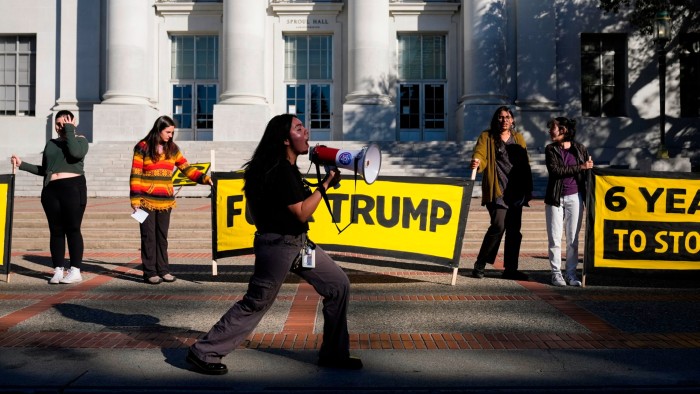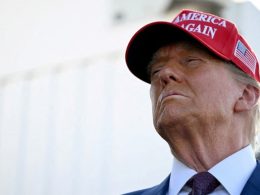US universities are bracing for the potential loss of billions of dollars if Donald Trump follows through on threats to pull federal funding and impose punitive taxes on institutions he says are “dominated by Marxist maniacs and lunatics”.
Trump has pledged to tax university’s endowments, cut federal research funding, squeeze the income they receive from students, and fine them for their stances on “culture war” issues.
That combination of pressures could accelerate the closure or mergers of a number of mid-sized colleges, Nick Dirks, former chancellor of the University of California, Berkeley, predicted. “This could be a perfect storm,” he said.
Trump targeted colleges repeatedly on the campaign trail, saying in one video last year: “We spend more money on higher education than any other country, and yet they’re turning our students into communists and terrorists and sympathisers of many, many different dimensions.”
“The writing is on the wall,” said Jonathan Fansmith, assistant vice-president of government relations at the American Council on Education, a membership organisation for universities and colleges, of the prospect of higher taxes on elite colleges’ endowments.
In his first term, Trump imposed a largely symbolic 1.4 per cent tax on net investment income generated by colleges with at least 500 students and endowment assets exceeding $500,000 per student.
JD Vance, who will be Trump’s vice-president, last year proposed raising the tax to 35 per cent. Endowments, he said, “have grown incredibly large on the backs of subsidies from the taxpayers”, insulating colleges from political or other pressures, “and that is why the university system in this country has gone so insane”.
The current tax cost 58 colleges just $244mn collectively in 2022, said Liz Clark, vice-president of policy and research at the National Association of College and University Business Officers. She added, however: “We are fairly certain that President Trump will work towards enacting some kind of tax legislation in 2025. We do expect more institutions to be impacted in time.”
Fansmith said “we expect to see a lot of attention from the Republicans” following harsh campaign rhetoric against universities this year, much of it linked to perceived antisemitic protests on campuses. This month the House of Representatives narrowly rejected a bill that would make it easier to strip non-profit organisations, including colleges, of their tax-exempt status, but this remained “the nuclear option,” he added.
Trump last year said that colleges pursuing positive discrimination and diversity initiatives which he called “unlawful discrimination” could be fined “up to the entire amount of their endowment”.
University officials also fear cuts to federal funding for research and development, both as punishment for their perceived ideology and as part of a broader aspiration to slash government spending.
Some pointed to rising scepticism over science, citing Trump’s intention to appoint as health secretary Robert F Kennedy Jr, an anti-vaccine campaigner with influence over billions of dollars in annual research funding.

“I’m really worried about Kennedy’s assault on the National Institutes of Health,” said one college president, expressing a concern that future NIH disbursements, which total $48bn a year, would be assessed less on the scientific merits of proposals.
“You could put one of the core instruments of American competitiveness in jeopardy,” he added.
A third area of concern is income from tuition fees, notably if the new administration succeeds in overturning President Joe Biden’s student loan forgiveness programmes or reallocates federal support to a broader range of shorter training courses from rival providers.
Trump has pledged to take resources from existing universities to fund a new free online American Academy and to overhaul the current accreditation system to support more vocational and for-profit training bodies.
Phillip Levine, a professor of economics at Wellesley College, said: “Higher education is likely in for a difficult period. A very large share of running colleges is about fixed costs. The easiest thing to do to save money is to reduce financial aid.”
He added that such an outcome was likely to reduce the prospects for advancing economic and social mobility for students. “Colleges would increase costs and reduce access — exactly the opposite effect to what the critics want.”
A final risk is a fall in the number of international students from the current record level of 1.1mn, given Republicans’ wider hostility to immigration and their support for tougher visa requirements.
Marty West, academic dean at the school of education at Harvard, said: “Our graduate school enrols a substantial number of international students. A reduction or even a slowdown in the visa process would be an enormous headache for us.”
Broader concerns about limitations on free speech, diversity initiatives and accusations of antisemitism on college campuses have hit applications to some colleges, and sparked lawsuits and Department of Education probes.
The withdrawal of donor support at institutions including Harvard and the University of Pennsylvania since the start of the Israel-Hamas war also risks reducing the scope for generating additional philanthropic income to compensate for a drop in federal funding.
Congressional Republicans may seek to temper some of Trump’s tougher actions for fear of damaging local economies by squeezing universities.
Even so, one university president said: “The amount of time and energy to fend off a lot of these attacks will be significant. We’re in the crosshairs of some really nasty and acrimonious culture wars.”
Source link









